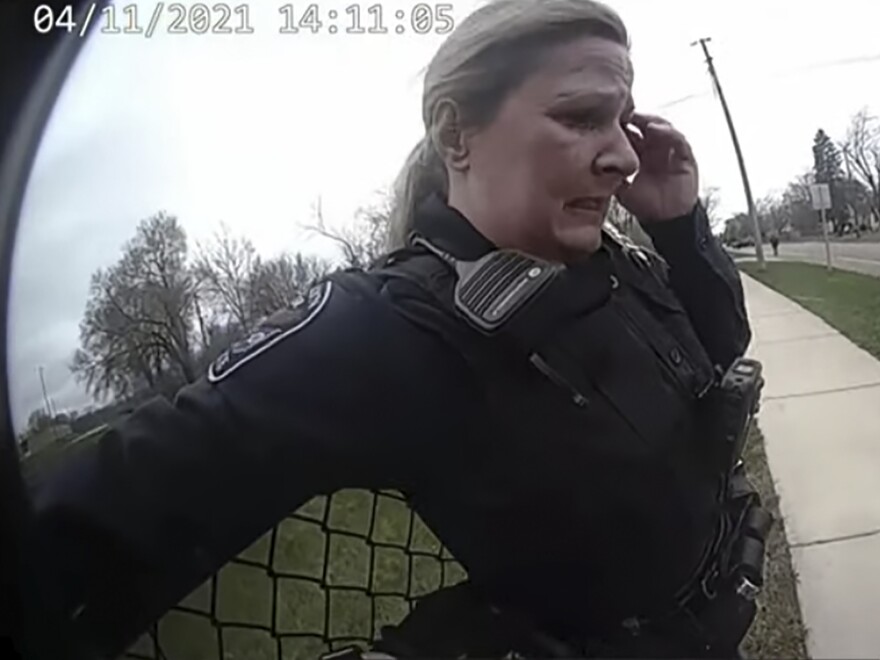Updated December 23, 2021 at 3:58 PM ET
Kim Potter, the former Minnesota police officer who mistakenly drew her handgun instead of her Taser during a traffic stop in April in which she fatally shot Daunte Wright, has been found guilty.
Jurors had been deliberating since Monday before finding Potter, who had served as an officer in Brooklyn Center, Minn., for 26 years, guilty of first- and second-degree manslaughter charges in the death of Wright.
Potter winced when the verdict was read but otherwise appeared not to react. A short while later, she was handcuffed and taken into custody pending sentencing.
Katie Bryant, Wright's mother, said after the trial that she felt "every single emotion that you could imagine" as the verdict was read. "I kind of let out a yelp, because it was built up in the anticipation of what was to come," she said.
Minnesota Attorney General Keith Ellison, whose office prosecuted the case, said they had achieved accountability for Wright's death.
"Accountability is not justice. Justice is restoration. Justice would be restoring Daunte to life and making the Wright family whole again," he added.
The verdict follows a closely watched two-week trial capped by Potter's turn on the witness stand, where she sobbed while recalling the shooting and said she was "so sorry" for what happened.
Whether Potter had intended to draw her Taser or handgun was not at issue in the trial. Lawyers for both sides agreed she mistakenly drew the wrong weapon. Instead, the trial centered on questions of whether she should have recognized she was holding the heavier metal gun or whether she should have drawn any weapon at all.
Potter is scheduled to be sentenced on Feb. 18. The state's sentencing guidelines recommend a sentence of roughly seven years for the first-degree charge and four years for the second-degree charge, though prosecutors indicated they would seek a longer sentence.
How the confrontation unfolded
The deadly confrontation on April 11 began when Potter, together with Anthony Luckey, a new officer she was training that day, pulled over Wright, a 20-year-old Black man, for having expired license tabs and a dangling air freshener on his rearview mirror — an infraction in Minnesota.
The stop escalated when police realized that Wright, though not armed, was wanted for arrest for failing to appear in court on a weapons charge. As Luckey attempted to arrest and handcuff Wright, Wright wriggled away and got back into his car.
Footage recorded by body-worn cameras and a dashboard camera in the squad car, which was played for jurors during the trial, captured the final chaotic moments of Wright's life.
"I'm going to tase you," Potter shouted. But in her right hand was a dark 9 mm Glock pistol, not the bright yellow Taser that remained holstered on her left side. Five seconds later, she yelled, "Taser! Taser! Taser!" and then fired a single round into Wright's side. He was pronounced dead on the scene.
The footage also shows the immediately aftermath of the shooting, in which Potter appears shocked. She gasps and says, "I grabbed the wrong f***ing gun" before collapsing to the curb with her head in her hands.
Prosecutors say she should have known the difference
Prosecutors did not dispute that the shooting was an accident. But they said that in her 26 years on the force, Potter had undergone extensive firearm and Taser training, including how to avoid confusing the two. They turned to use-of-force experts and the police department's policy handbook to argue that the use of a Taser was inappropriate to begin with.
"She drew a deadly weapon, she aimed it, she pointed it at Daunte Wright's chest and she fired," Assistant Attorney General Erin Eldridge said during the state's closing argument on Monday.
"This was no little oopsie. This was not putting the wrong date on a check. This was not entering the wrong password somewhere. This was a colossal screw-up, a blunder of epic proportions," Eldridge said. "It was precisely the thing she had been warned about for years, and she had been trained to prevent it."
Her attorneys call what happened a "mistake," not a crime
Potter's defense team argued that Wright had caused his own death by ignoring police orders and attempting to escape. Because of that, they said, Potter should not be held criminally liable.
"A mistake is not a crime," attorney Earl Gray told jurors in closing arguments.
"In the walk of life, nobody's perfect. Everybody makes mistakes. Some of those mistakes are small mistakes, but some of them are very serious."
Potter's lawyers also argued that the use of deadly force was appropriate, because a third officer, Sgt. Mychal Johnson, was leaning into the car through the passenger door in an attempt to keep Wright from controlling the gearshift. Had Wright been allowed to drive away, they said, Johnson's safety would have been in jeopardy.
Potter, who resigned from the force following the shooting, broke down on the stand on Friday, crying as she testified that she "didn't want to hurt anybody."
Under questioning by the prosecution, Potter expressed regret. "I'm sorry it happened," she said between sobs.
Wright's death occurred roughly 10 miles from the courthouse where Derek Chauvin, a former Minneapolis police officer, was convicted in a trial for murdering George Floyd, whose death fueled national protests against police abuse and racial injustice.
Potter is believed to be the third Minnesota police officer to be convicted in the on-duty death of a civilian. The first was Mohamed Noor, a Somali American officer found guilty of manslaughter after fatally shooting a white woman. Chauvin became the second when he was convicted of murder in April.
Copyright 2021 NPR. To see more, visit https://www.npr.org.







